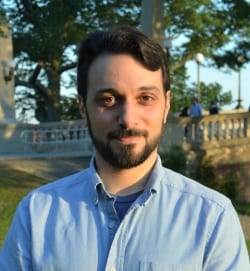Mustafa Ozgur Bozcaga
Tuesday, May, 25th, 2021 Students
 |
Mustafa Ozgur BozcagaSchool: Graduate School of Arts and Sciences, the Fletcher School Department: Economics Research Interests: Energy Innovation, Climate Change, International Relations, Business and Economics, Energy Economics |
TIE Affiliation
Environmental Research Fellowship
Research
Carbon pricing (CP) imposes a monetary value on the external costs of emitting greenhouse gases (GHGs) for climate change mitigation. Today, the French carbon tax is one of the most ambitious CP initiatives in terms of government revenue size and the tax rate. The policy allowed a steady increase carbon tax rate between 2014-2018. However, the Yellow Vests protests that erupted at the end of 2018 caused the French carbon tax to deviate from its proposed trajectory of annual rate hikes. Using this unexpected deviation from the anticipated tightening of environmental regulations, my proposed research aims to provide causal estimates on how capital markets and firms respond to changes in climate policy. In this regard, I aim to answer, how capital markets respond to an unexpected shift in the trajectory of energy prices and how the economic performance of firms with varying energy intensities changes when anticipated energy prices decrease?
Experience
Mustafa is a Ph.D. candidate at the Graduate School of Arts and Sciences and the Fletcher School in the Economics department. He expects to complete his studies in May 2022. Prior to Tufts he received a M.A. in Political Economy at New York University and B.A. in Political Science and International Relations at Bogazici University (Istanbul, Turkey). During his work experience in governmental, non-governmental, and international organizations before Tufts, Mustafa had the opportunity to contribute to the development of climate mitigation policies and develop partnerships between public and private stakeholders, both at the national and international levels. At the Secretariat of the World Water Forum, he coordinated and edited the outputs of the intergovernmental meetings, circulated as a UN General Assembly document. During his job at one of the leading Turkish think tanks, the Economic Development Foundation of Turkey, Mustafa provided technical assistance to the Ministry of Environment and the Grand National Assembly of Turkey for draft legislation on climate change and industrial pollution control. Finally, at the Directorate for EU Affairs at the Turkish Ministry of Foreign Affairs, he had the chance to evaluate and monitor draft legislative processes in Turkey’s European Union accession process and coordinated Turkey-European Commission meetings on EU reforms. During the coursework phase of his Ph.D., Mustafa did not constrain himself solely with economics courses and wanted to learn methods in other fields of study such as geospatial analysis, computer science, and engineering. He has attended courses in these fields at Tufts and still actively communicates with colleagues working on these areas. With the guidance of his advisors at Tufts, he acts as a consultant for the Climate Change Group at the World Bank Group (WBG). Mustafa actively contributes to the State and Trends of Carbon Pricing Reports, the flagship report of the WBG on carbon pricing, and the Carbon Pricing Dashboard, the main source for most up-to-date information and data on carbon pricing for policymakers, practitioners, and academics.
Current Studies and Future Goals
When asked what he found most meaningful about his field of study, Mustafa responded with the following: “Many assume climate change is a problem that humanity needs to tackle in the next decade and beyond. However, it is an imminent problem that needs to be addressed today with mitigation and adaptation measures both at the local and the global level. These policies should not only be effective to reduce the impacts of climate change, but they need to be backed by scientific evidence that endorses the most cutting-edge methods in estimating the repercussions of such policies under uncertainty. The tools in the fields of economics and public policy allow scholars like me to address challenges in estimating the costs and benefits of climate change mitigation policies with a long-term horizon and at a global scale. I find the role that my discipline plays in informing policymakers about the most beneficial solutions to overcome climate change as the most meaningful aspect of my field."
When asked what interested him in becoming a TIE Fellow, Mustafa responded with the following: “Due to the nature of the research involved, doctoral candidates might be too bounded with the methods and approaches of their own field of study. I got interested in the TIE Fellows program to learn from and get acquainted with early-career scholars in different disciplines working on issues related to the environment, climate change, and energy at Tufts."
After Tufts, Mustafa hopes to continue working in the research space in climate change and energy economics to have a direct effect on informing policymakers, corporations, and the general public for adopting the most appropriate actions to tackle climate change and transition to a low carbon society.
Fun Facts!
When not doing school work, Mustafa enjoys spending hours at different playgrounds with his daughter and watching movies on his perpetually growing IMDB list.
Favorite food/drink: Manti, Daquiri
Favorite movie/TV show: Once upon a time in Anatolia by Nuri Bilge Ceylan, The Wire
Favorite course taken at Tufts: Climate change economics by Gib Metcalf